Side by Side: Connecting Sacred Dialogue and Responses in Promoting Gender Equality and Human Rights
September 2025
In alignment with the Commission on the Status of Women (CSW) Revitalization process, the Gender Working Group of the Multi-Faith Advisory Council (MFAC) and members of the Inter-Agency Task Force on Religion and Sustainable Development (IATF-Religion) co-hosted a roundtable event on the margins of the 80th United Nations General Assembly (UNGA) with UN Agencies, faith-based organizations, and civil society members to strengthen cross-sectoral dialogue and highlight good practices, success stories, challenges, and on-the-ground experiences that demonstrate positive faith-based responses to advancing the Beijing+30 commitments.
Backlash on Gender Equality at CSW69
The sixty-ninth session of the Commission on the Status of Women (CSW69) emphasized that gender discrimination remains deeply embedded in the structures of economies and societies. In UN Women’s CSW69 report, it was documented that in 2024, nearly a quarter of governments worldwide reported a backlash on gender equality, hindering the full implementation of the Beijing Platform for Action.
The MFAC Gender Working Group, as a monitoring mechanism on narratives surrounding SDG 5, conducted research analyzing Member State rhetoric, non-governmental organizations (NGO) submissions, and civil society discourse during CSW69 to equip faith-based organizations with insights, language, and strategies to respond to the pushback on women’s rights. Building on these findings, supporting ongoing CSW revitalization efforts, the MFAC Gender Working Group developed an advocacy brief to initiate dialogue among faith-based and multilateral actors on how to collectively use positive faith-based examples to illustrate how to counter groups challenging rights-based approaches.
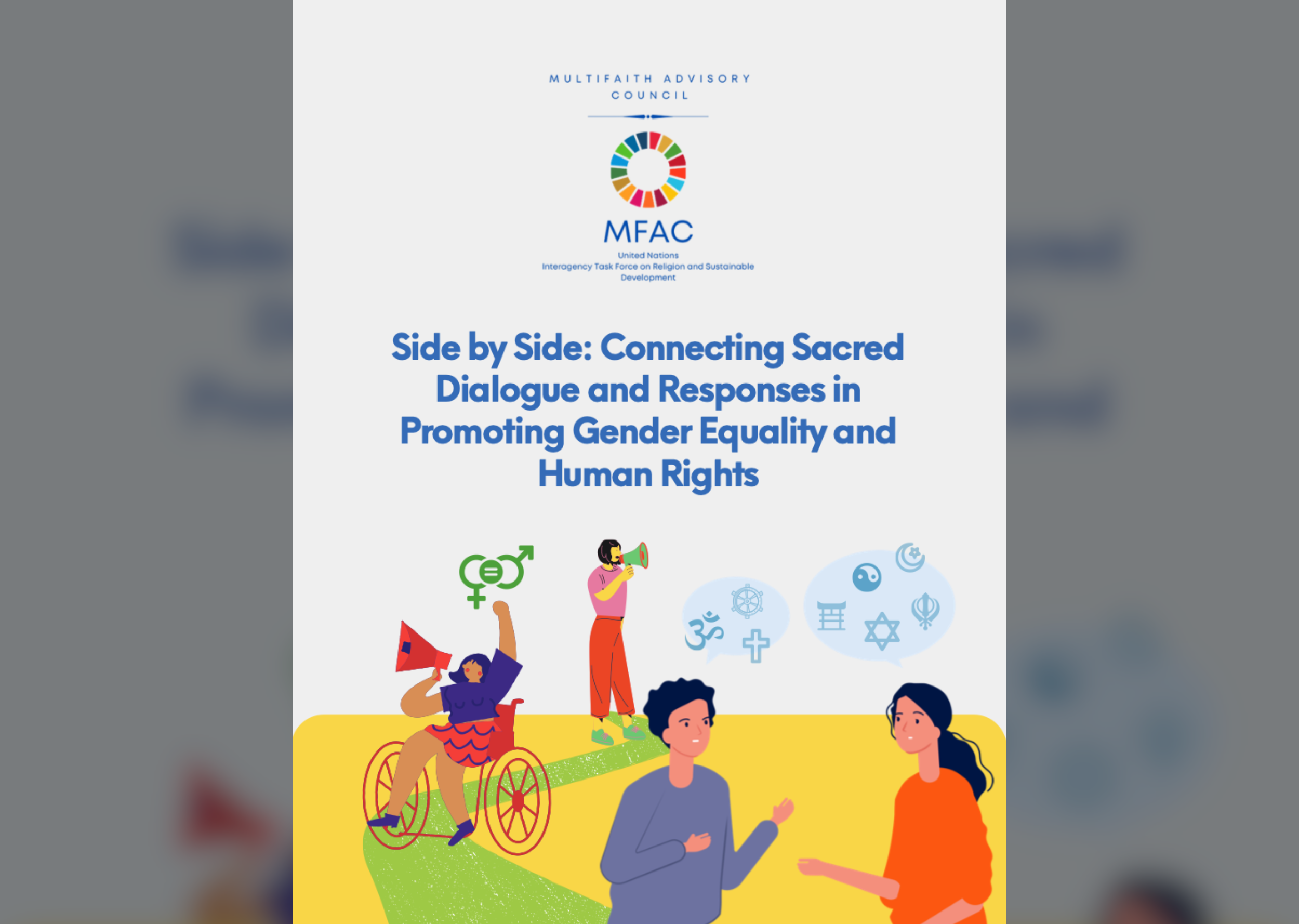
Side by Side: Connecting Sacred Dialogue and Responses in Promoting Gender Equality and Human Rights
Launch of Advocacy Brief
The roundtable, Side by Side: Connecting Sacred Dialogue and Responses in Promoting Gender Equality and Human Rights, provided a platform to explore the advocacy brief’s findings and expand upon a compendium of positive faith-based responses. Participants considered practical applications for how the brief can be utilized to strengthen policy and build knowledge and capacity on how religion can positively contribute to advancing gender equality.
Dimitra Missira, External Relations, Equality, and Inclusion Officer for the Executive Office of the Secretary General at the International Dialogue Centre (KAICIID), opened the event as Co-Chair of the MFAC Gender Working Group. Missira emphasized that faith communities have the ability to influence norms, mobilize, and transform societies in the face of growing backlash against gender equality, stating the MFAC Gender Working Group is proud to launch the Side by Side: Connecting Sacred Dialogue and Responses in Promoting Gender Equality and Human Rights advocacy brief highlighting positive faith-rooted responses for countering harmful narratives and providing concrete actions for collective response.
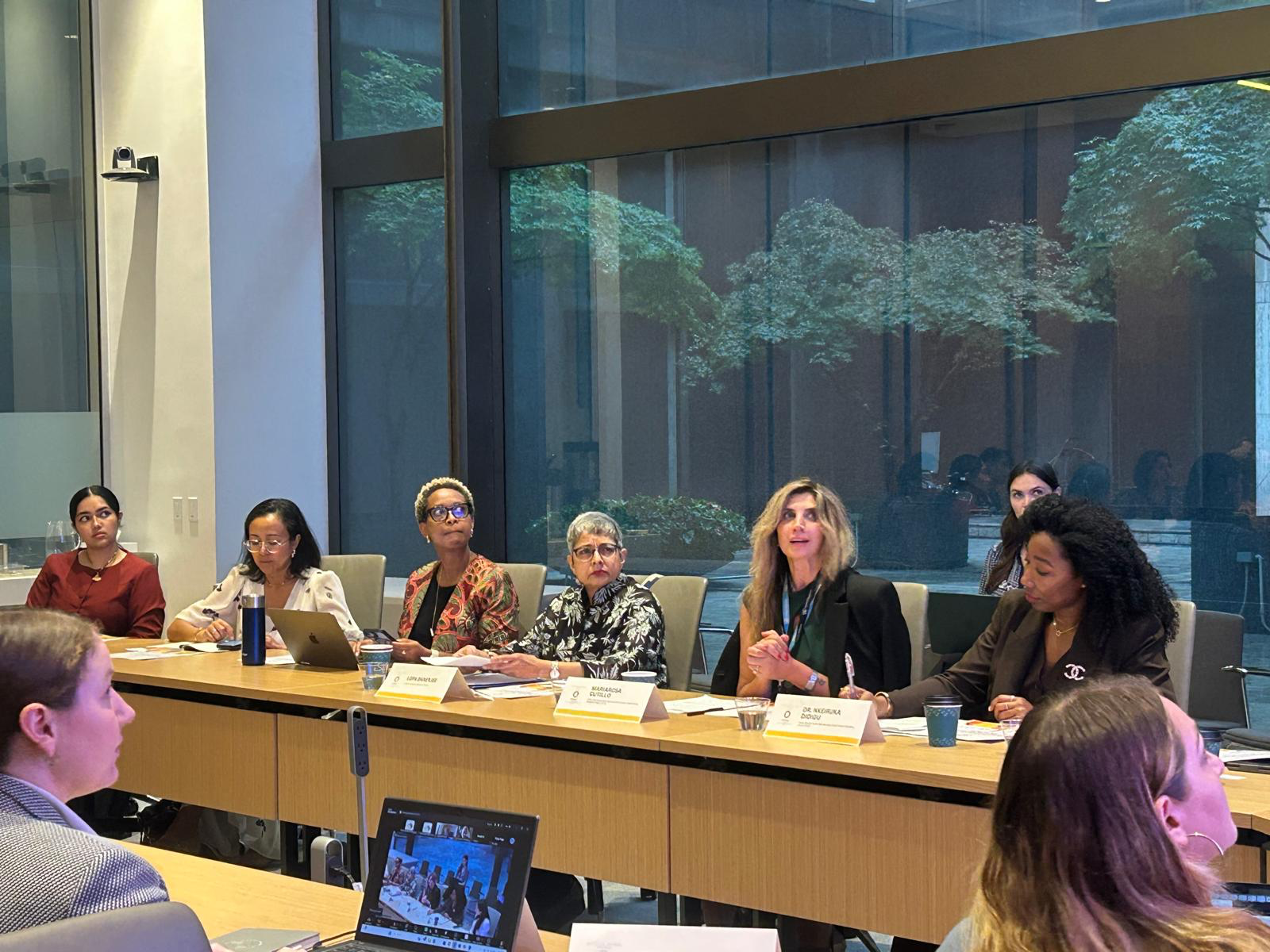
Mariarosa Cutillo provides opening remarks calling for inclusive multilateralism.
During the high-level opening remarks, Mariarosa Cutillo, Chief of the Private Sector and Civil Society Branch for the United Nations Population Fund (UNFPA), reiterated that the brief is sending a strong message that “constructive multilateralism is possible through the work we do together.” Cutillo highlighted her belief in inclusive multilateralism, insisting the multilateral system must pragmatically include different actors, and asserted that integrity and a commitment to human rights have been an essential cornerstone in defending the rights of women and girls. She finished her remarks with a call to action to build a strong communication strategy around the brief and its tools, disseminating them widely.
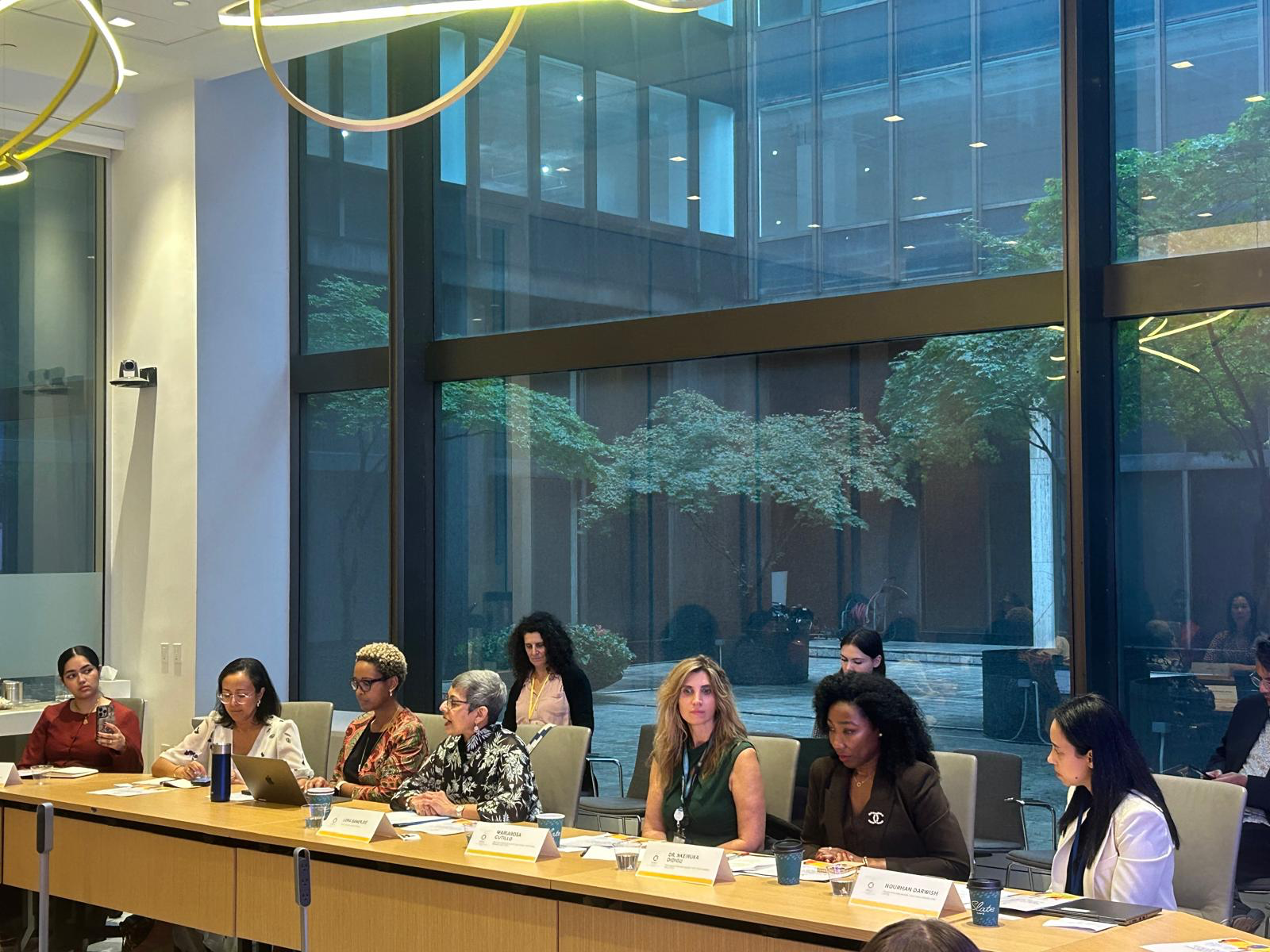
Lopa Banerjee speaks about global progress for gender equality and working together to promote positive narratives.
Following Cutillo’s remarks, Lopa Banerjee, Director of the Civil Society Division for UN Women, announced that UN Women is proud to partner on the brief’s publication, united by a belief in the collective action of society. Banerjee highlighted global progress for gender equality, including more girls in school than ever before, over 88 percent of countries having passed laws and established services for ending violence against women and girls, and more than 100 governments and 20 heads of state having stepped forward with over 150 general actions on how they will accelerate progress on gender equality between now and 2030. Banerjee closed her remarks by reiterating that the brief is a timely and powerful resource to contribute to gender rights work, upholding faith values of dignity and compassion, as UN Women supports the Brief’s call to action to work together promoting positive narratives rooted in sacred texts and experience. She stated, “Gender equality is not an ideology; it is the foundation of peace, equality, and human rights.”
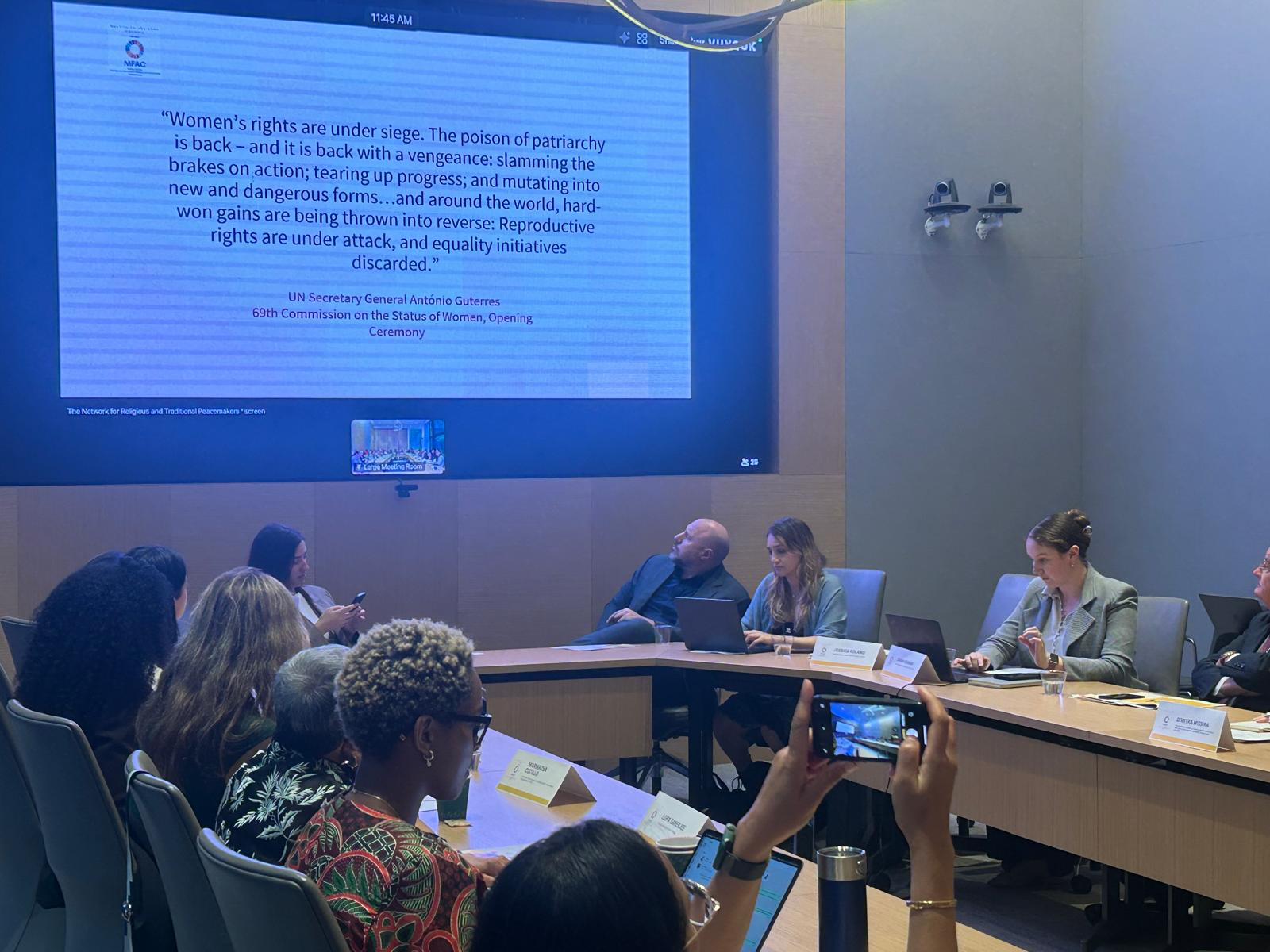
Sarah Rehman presents an overview of research from the advocacy brief highlighting key examples of pushback and positive response.
Sarah Rehman, Membership and Administrative Specialist for the Network for Religious and Traditional Peacemakers, presented a research overview sharing outcomes and key highlights from the brief, analyzing anti-rights pushback at CSW69. Rehman introduced gender, motherhood, and intersectionality and inclusion as the key areas of pushback. She discussed some of the well-crafted messaging and tactics being used to infiltrate and disrupt gender advocacy, highlighting areas of contention. Rehman framed the pushback analysis as a map to possible points of entry.
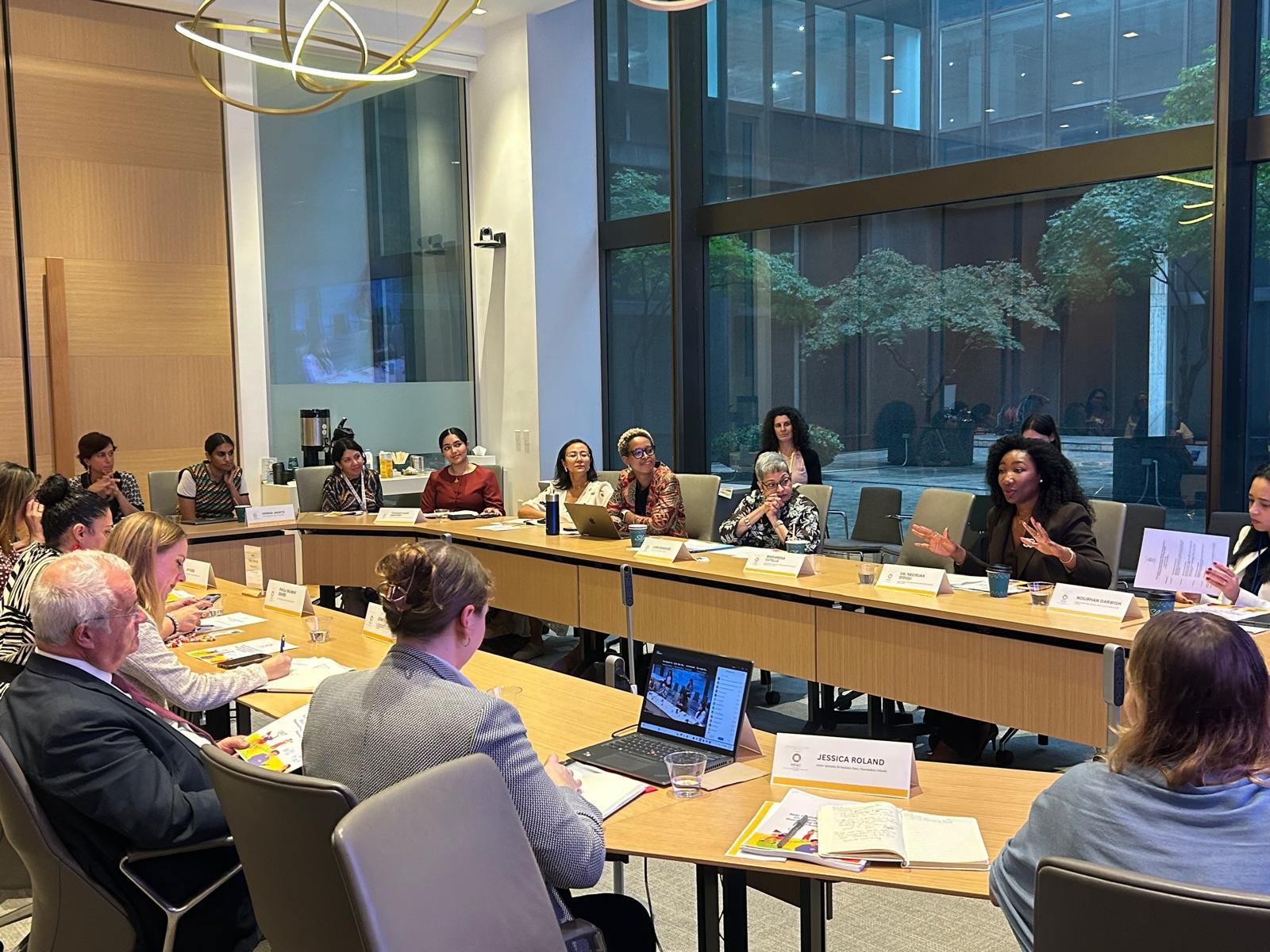
Dr. Nkeiruka Didigu moderates the roundtable discussion encouraging panelists to contextualize the advocacy brief through their own faiths and examples of best practice.
Following, Dr. Nkeiruka Didigu, Senior Strategic Partnerships Specialist for UNFPA, moderated a roundtable discussion. Ivy Koek, MFAC Co-Chair and UN Representative for Soka Gakkai International, reiterated that anti-rights actors are using clear and united messaging that has been built for decades, calling for faith actors, secular feminists, UN representatives, and other stakeholders to unite around common causes and messaging. Koek advised it can be challenging to find the right language to unite people across faiths, remembering that faith groups are not the same despite often being grouped together. Koek emphasized the value of having the brief’s findings tangibly available, upholding that collective faith-based response does resonate.
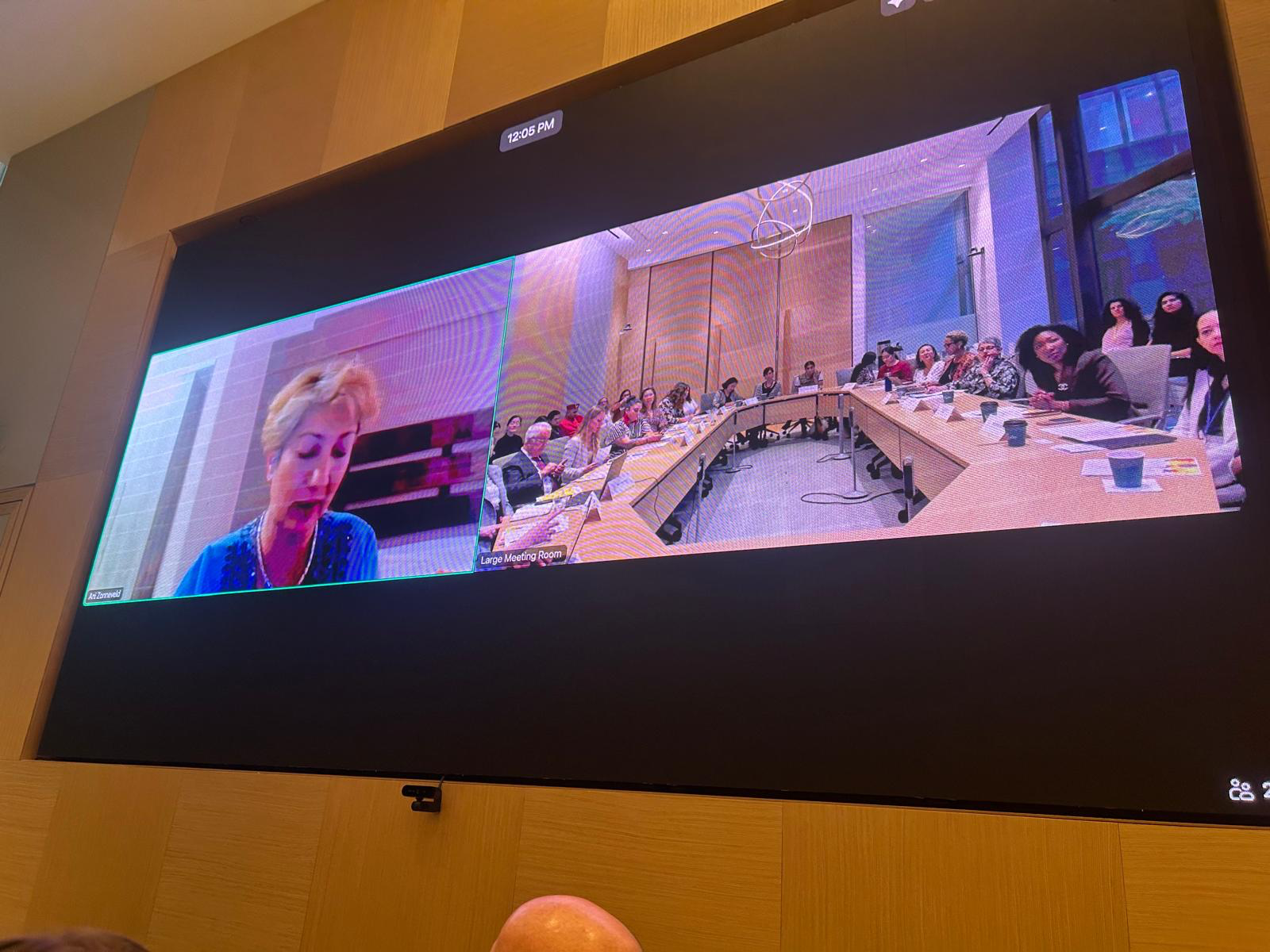
Ani Zonneveld speaks about the importance of organizing a common mission.
Ani Zonneveld, Founder and President of Muslims for Progressive Values, provided further encouragement, sharing the example of a conference in Nairobi on family values where all the speakers were straight white Christian men. Zonneveld assured that the response in Nairobi was not positive as people identified the neo-colonialist tones underpinning their supposedly ‘traditional’ values. Zonneveld insisted that funders sidelining gender equality advocates from a progressive faith framing was a huge mistake; it is now essential to organize and unite around a common mission and vision.
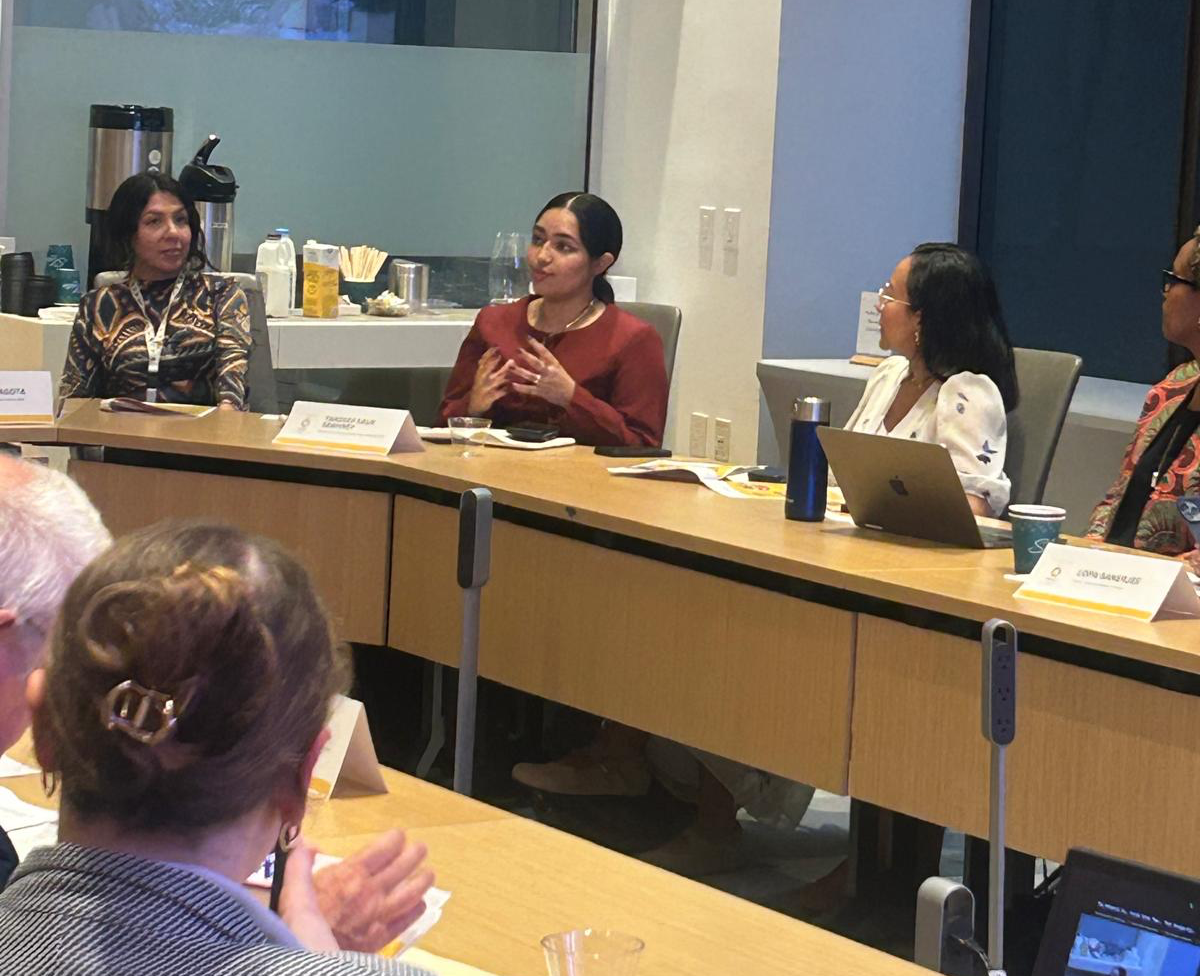
Tandeep Kaur Sawhney expands upon the importance of youth participation and diverse historical references.
Following, Tandeep Kaur Sawhney, Fellow at the Interfaith Center of New York, advocated that it is essential to have young people at the table, supporting their vision and role. Sawhney elaborated on numerous examples in scripture and action from across the Sikh faith, including how the Guru Granth Sahib Ji, the Sikh scripture, refers to the divine as Akaal Murat—formless—while Gurbani metaphorically calls all disciples “suhagans” (brides), emphasizing gender equality. She demonstrated how both scriptural teachings and historical actions within Sikhi have consistently established equal rights and space for women since the 15th century.
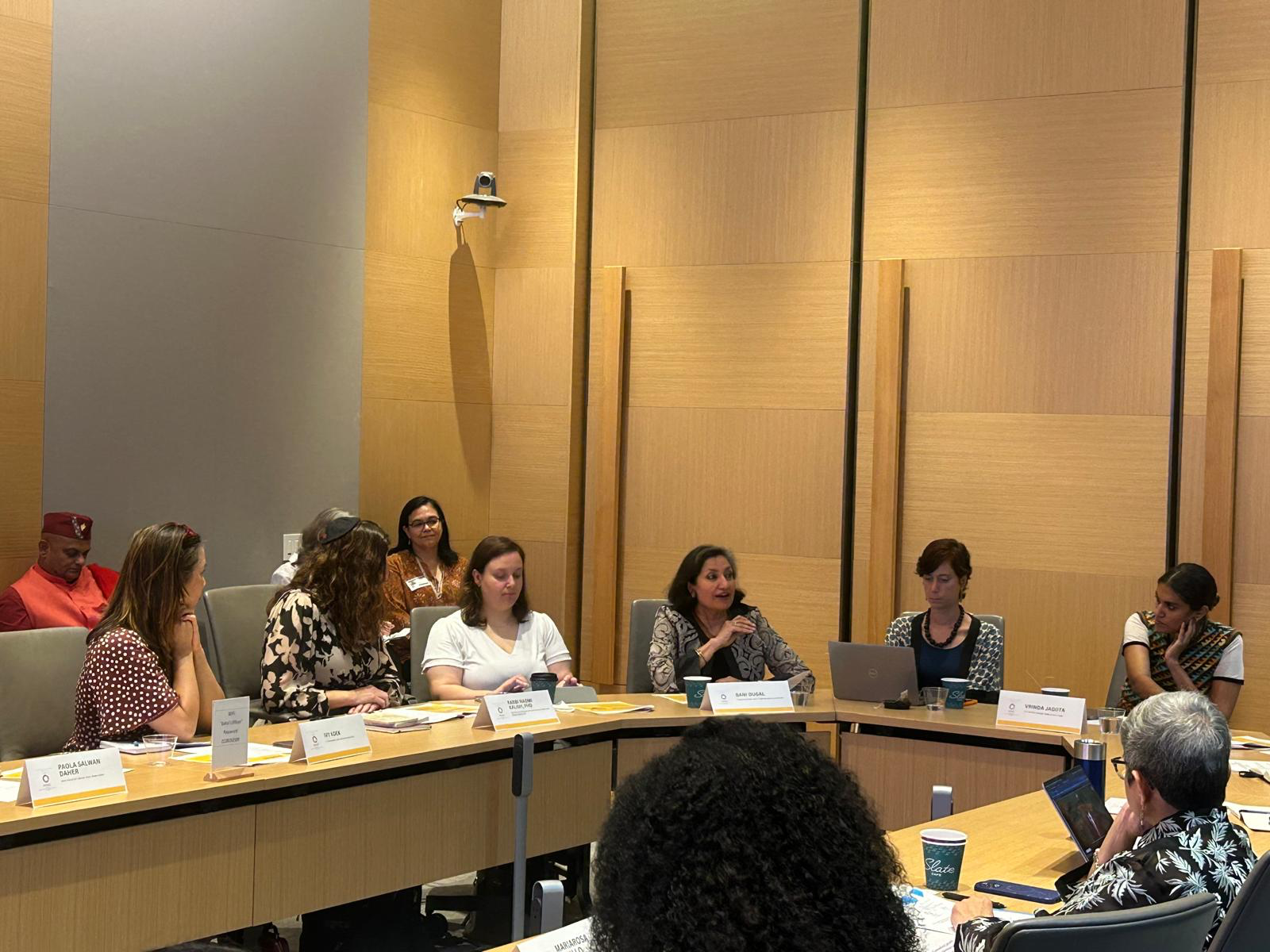
Bani Dugal speaks about Bahá’í teachings on compassion and harmonious partnership.
Bani Dugal, Principal Representative to the UN for the Bahá’í International Community, further built on these examples by sharing that Bahá’í teachings affirm that “the soul has no gender,” recognizing each person’s intrinsic potential and respect. Dugal also discussed the Bahá’í belief that if women are prevented from attaining their highest possibilities, men will be unable to achieve theirs, underscoring the importance of harmonious partnership. She emphasized the need to promote dialogue and design a savvy approach to pushback, grounded in unity and compassion.
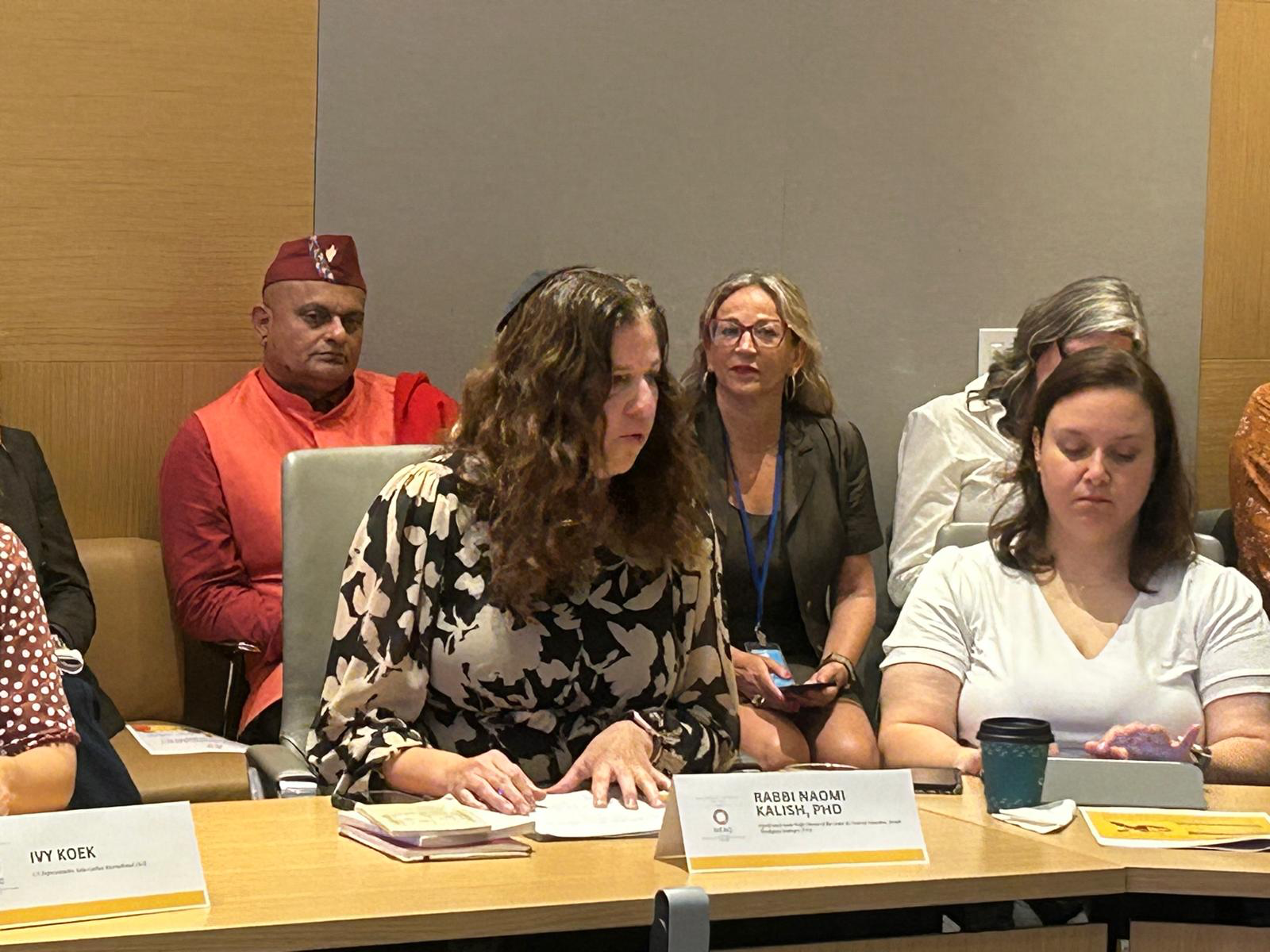
Rabbi Naomi Kalish speaks about gender equality and women’s multifaceted experiences.
Rabbi Naomi Kalish, PhD, Harold and Carole Wolfe Director of the Center for Pastoral Education, Jewish Theological Seminary, asserted that gender equality, family, and motherhood all revolve around women’s ability to make their own choices and live multifaceted lives. Rabbi Kalish delved into an idea in the Jewish faith of the divine feminine and the feminine side of God, before explaining that “God is not gendered; however, language is gendered.” Rabbi Kalish emphasized that women should be empowered to make their own decisions, including around motherhood and workforce participation, stating women need choice and influence.
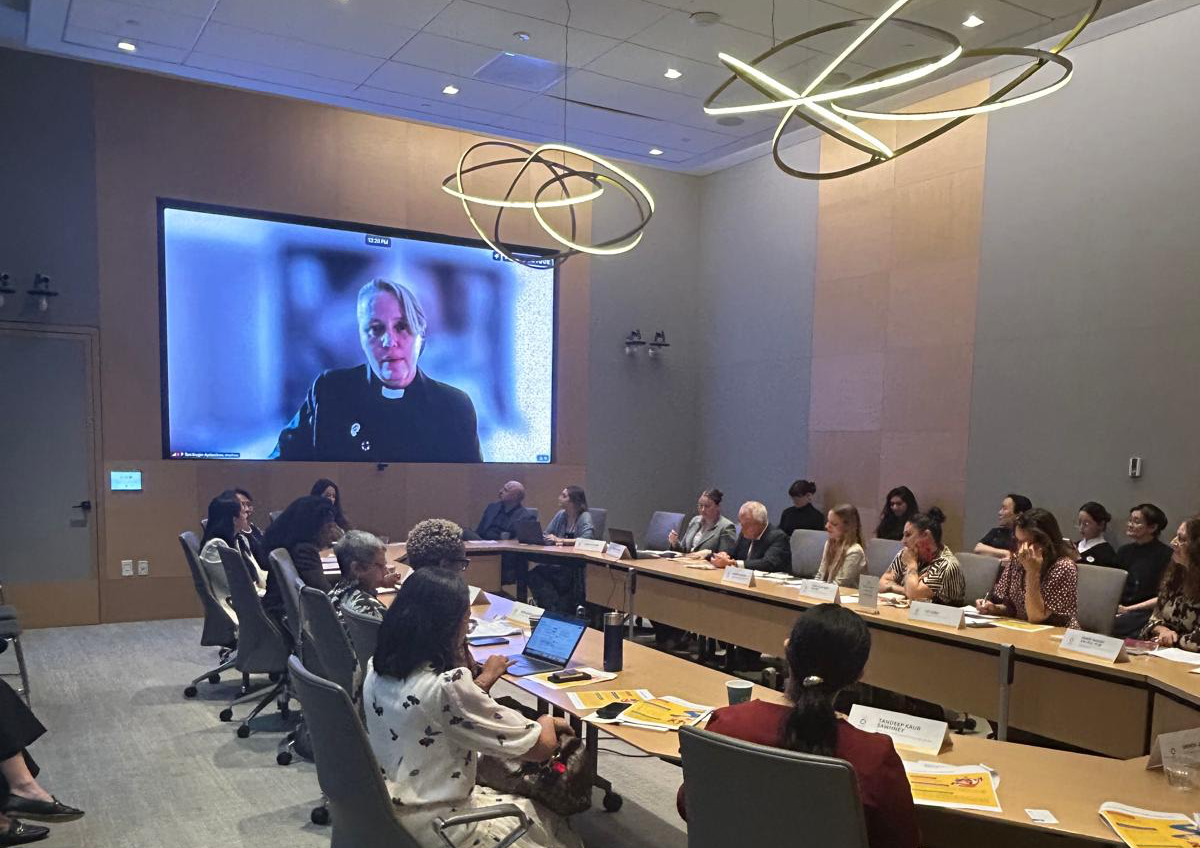
Rev. Toni Kruger-Ayebazibwe advocates for expanding and uplifting inclusive family values.
Rev. Toni Kruger-Ayebazibwe, Executive Director of the Global Interfaith Network for People of All Sexes, Sexual Orientations, Gender Identities and Expressions, then highlighted work being done to combat narrow framings of family and uplift family values, including around the LGBTQIA+ community. She stressed that family cannot be excluded from a reframing of motherhood. In a call to action, Rev. Kruger-Ayebazibwe pledged “there is a difference between people who don’t know and trolls,” insisting people who don’t know may be afraid or ignorant; they must be reached.
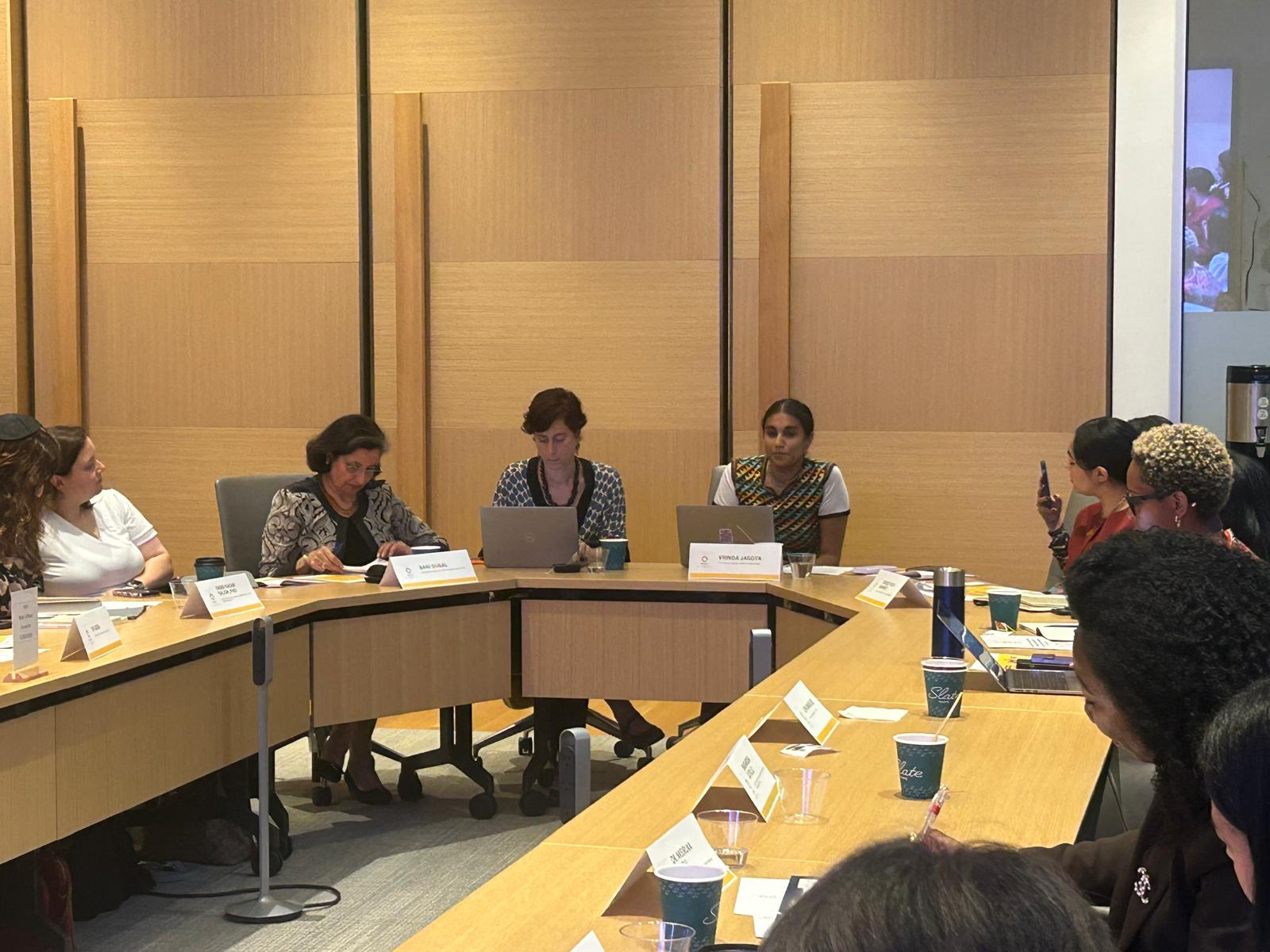
Vrinda Jagota advocates for collective liberation and uplifting women in resistance.
Vrinda Jagota, NYC Organizer for Hindus for Human Rights, championed her belief in collective liberation, meaning that none are free until all of us are free, and cautioned against the nationalist movements promoting limitations on women’s roles and harmful narratives that encourage discrimination and sexual violence. Jagota spoke to the Hindu belief in the divinity of every being, advocating to support a more joyful and just future by organizing and uplifting women in resistance, creating space for justice and human rights defense.
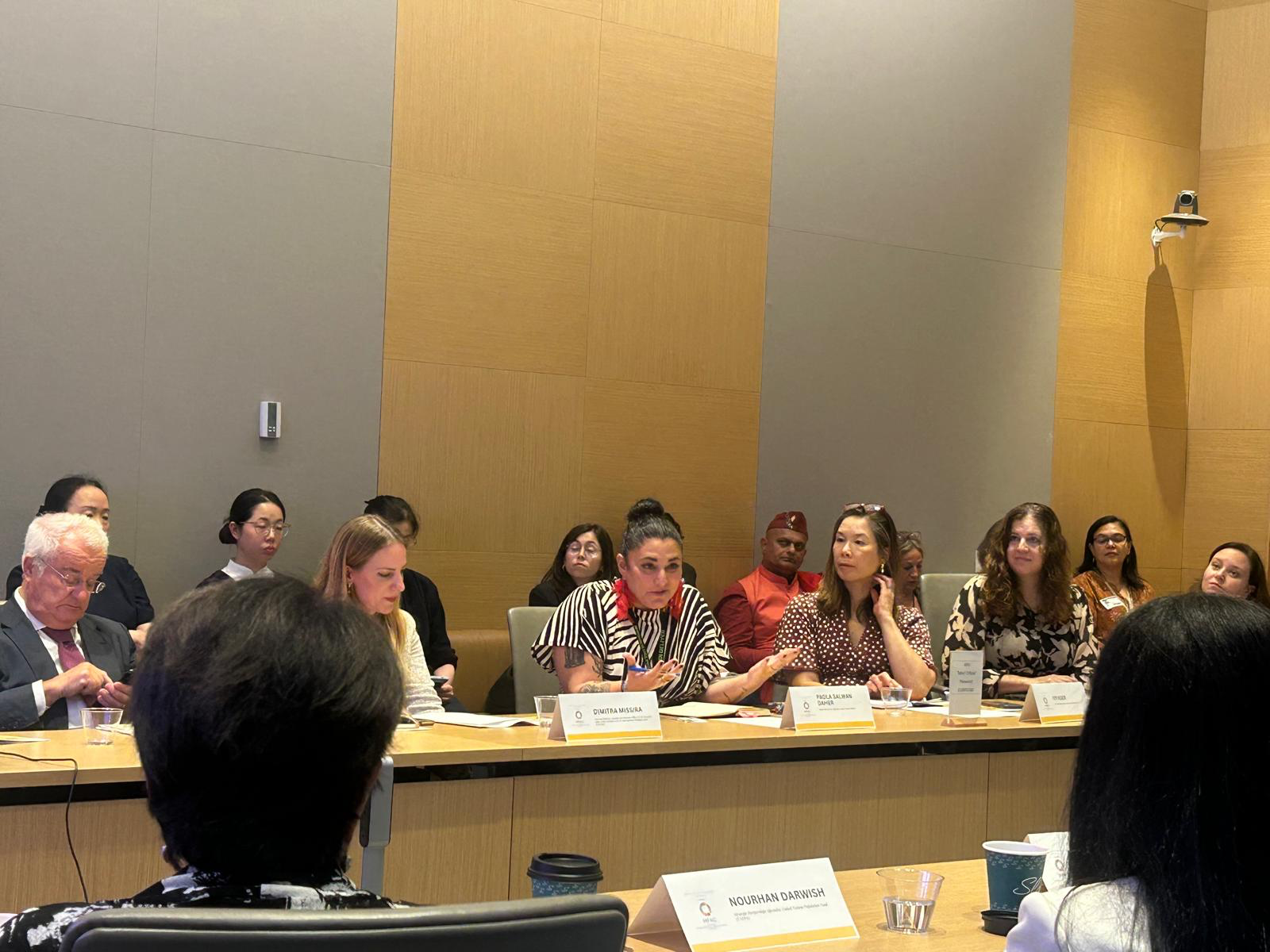
Paola Salwan Daher speaks about the Feminist Playbook and creating a common vision.
Presenting reflections from the broader feminist movement, Paola Salwan Daher, Senior Director for Collective Action for Women Deliver, posited that the gender equality sector has secured tremendous advances in women’s rights, and present backlash is a direct result of that success. Daher highlighted ways Women Deliver uses its convening power to advance women’s rights, including hosting their annual conference Women Deliver 2026 this year in Australia. Women Deliver is also creating a Feminist Playbook to be launched at the conference. Daher states that the right’s counter arguments have little to do with faith and more to do with a societal project to instrumentalize the rights of women and girls, using gender equality and sexual reproductive health and rights to dismantle other rights and protections. She calls for women’s rights advocates to remain diligent as the right works to instrumentalize multilateral spaces to undermine them, defining and co-creating a common vision.
During her closing remarks, Jessica Roland, MFAC Gender Working Group Co-Chair and Senior Specialist for Inclusive Peace at the Network for Religious and Traditional Peacemakers, framed the advocacy brief launch as a starting point to advance dialogue before building a larger compendium that will launch at CSW next year. Roland shared that anyone can take part in contributing to the compendium and can follow-up with her directly if interested at un.mfac@gmail.com.
Follow the Peacemakers Network on social
